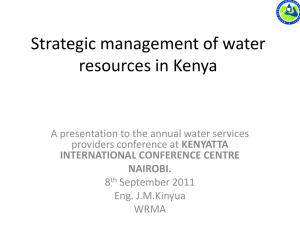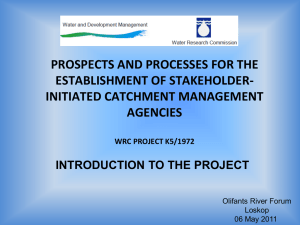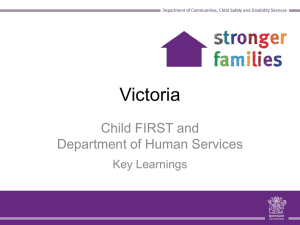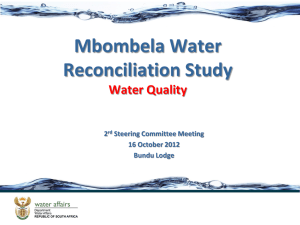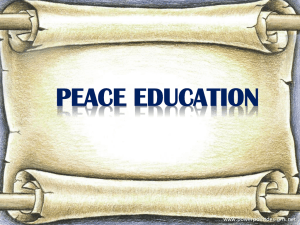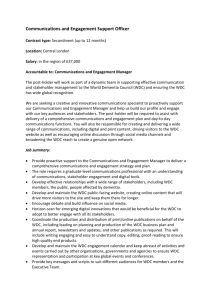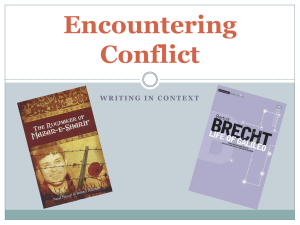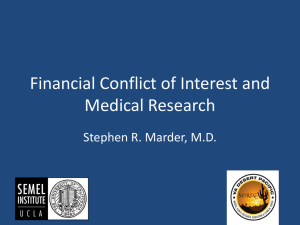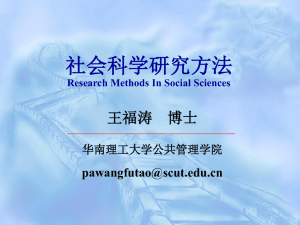Funding For Catchment Protection and how to submit a Community
advertisement
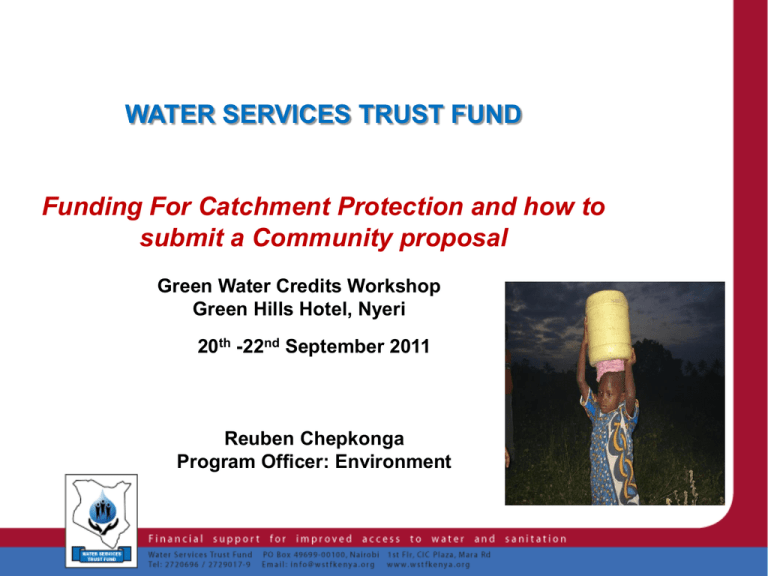
WATER SERVICES TRUST FUND Funding For Catchment Protection and how to submit a Community proposal Green Water Credits Workshop Green Hills Hotel, Nyeri 20th -22nd September 2011 Reuben Chepkonga Program Officer: Environment Introduction to WDC • WDC funding window was established in December 2008 by WSTF and WRMA • Established to channel investment into water resource management at local level through WRUAs • Necessitated by the fact that more than 50% of Kenyans obtain their water from the traditional water sources rather than an improved water supply • Funds are used for capacity building of WRUAs, development and Implementation of Sub Catchment Management Plans Introduction to WRUA • What is a WRUA • A WRUA is an association of water users, riparian land owners , or other stakeholders who have formally and voluntarily associated for the purposes of cooperatively sharing, managing and conserving a common water resource • WRUA membership • • • • Riparian Members Abstractor Members Non –Consumptive Members- (Polluters, Hydro-power, tourism, fishing) Observer Members WRUA Objectives • Promote controlled and legal water use activities; • Promote good management practices to make efficient and sustainable use of the water resource; • Promote water conservation practices to ensure sufficient water reserves that meet the demands of the environment, the wildlife, the livestock and all the communities who rely on the water resource; • To work towards reducing conflict in use of the water resource and participate in solving those that arise; • Promote catchment conservation measures to improve water quantities and quality WRUA Development Stages Formation Stage •Membership is poorly defined •Interim Management •Weak Financial systems •Registration in progress •Constitution being developed Infant Stage •Registered •New Management Systems •Financial systems improving •Growing membership •Resource Conflicts Identified •Tentative Action Plans Mature Stage •Operational Governance Structures •Financial systems well established •Management efficient •Systems in place to handle conflicts •Action Plans developed WRUA formation and Funding Stages • • • • • • • • • 1st Awareness meeting Registration of members Election of Committee/ Officials Develop Constitution /by laws Registration with Attorney General Open a Bank Account Registration with WRMA Sign MoU with WRMA Proposal preparation and Submission to WRMA • Appraisal of proposal by WRMA & WSTF • Approval of proposals by WSTF • Contract preparation & Signing • Cheque presentation/Electronic Funds Transfer • Implementation of activities • Monitoring, Evaluation and Reporting • Funds Accountability/Audits • Submission of Returns and Application for next level of funding WDC Funding Process WRUA Application for Funding WRMA WSTF Desk Appraisal Field Appraisal Contract/Release of Funds Implementation of Activities Monitoring Progress Reports Auditing WDC Funding Levels Funding Ceilings • Level 1- Ksh. 1 million • Level 2- Ksh. 2million • Level 3- Ksh. 5 million • Level 4- Ksh. 10million • Level 5- Ksh. 50 million WRUA Development Stages • Young WRUAs- Capacity Building and SCMP development • Mature WRUAs- SCMP Implementation Eligible areas Category Category 1 Surface Water State of the resource ALARM Resource is periodically scarce, Water reserve threatened Groundwater WQ or levels declining Water Quality Catchment severely degraded, Pollution levels high, Risk to human life is high Conflicts Category 2 Surface Water Groundwater Water Quality Conflicts Category 3 Surface Water Groundwater Water Quality Conflicts Potential for conflicts is high ALERT Trend is towards scarcity Trend is towards over abstraction Declining trend in water quality Ingredients for conflicts, e.g. ethnic, religious, language divisions SATISFACTORY Water resource sufficient in quantity & quality No tangible impact WQ adequate, low risk Low risk of conflict Eligibility Criteria cont….. • WRMA Pilot SubCatchments • New or Young WRUAs • Existing Mature WRUAs • WRUA Boundaries/Area of coverage • Local Contribution (15%) • Eligible activities Baseline data collection: abstraction survey, socio-economic surveys, and water resource surveys Monitoring Water Resource and Use; WRUA Training/Capacity Building and mobilization activities; Infrastructure planning and development: sub-surface dam, earth dams, pans, sand dams, roof catchment, trapezoidal, soil conservation and catchment protection structures, intakes, river bank protection, structures to reduce effluent discharge, development of water allocation plans and structures geared towards reducing conflicts Sub-Catchment Management Plan 1. 2. 3. 4. 5. 6. 7. 8. Introduction Overview Of Sub-catchment Water Resource Problems Management Approach Water Balance Water Allocation Resource Protection Catchment Protection • Surveys & conservation of Riparian area • Erosion/sediment surveys • Soil and water conservation plans • Catchment rehabilitation 9. Institutional Development 10. Infrastructure Development 11. Rights Based Approach / Poverty Reduction 12. Monitoring And Information 13. Financing And Implementation WRUA Eligibility Criteria • • • • • • • • • • • SHG (Pilot Phase) or Legal Registration (Trust or Society) certificate; WRUA must be registered by WRMA; Constitution, Katiba; Properly Elected Officials; Bank Account;-Savings, Current Minutes of meetings & AGM; Audited accounts and Audit Report; Financial Records (Bank statement, etc); Procurement Records (Quotations, tender evaluation reports, etc); SCMP developed through participation in an SCMP workshop; Progress Report detailing implementation progress against previously released WDC funds What Happens to application at WSTF? Receive Hard copy and Soft Copies of WRUA Application based on first come first served basis Preparation of Contracts and sending to WRMA/WRUAS “Record“ of WRUA by Assigning a WSTF number if new Signing of Contracts by WRUAs, WRMA, WSTF Appraisal of Proposals based on Unit Cost Standards Preparation and sending of Cheques/EFT Preparation of Briefs (Summary of WRUA Application for MIC) Writing of letters notifying WRMA/WRUA of Cheques release Presentation/defending of Briefs to Management Investment Committee (MIC) for Approval Monitoring and Reporting -field visits/telephone follow-ups Presentation of Briefs to Investment Committee for budgets exceeding 2Million for Approval Audits of WRUAs –Internal and External Revision of Proposals based on recommendations of the MIC & IC Receive SCMP, Reports, Expenditure Returns and Application for next Level Points to Note…… • Soil and Water Conservation • Level 1: Capacity Building • Level 2: SCMP Implementation-catchment protection • Engagement of Support Organizations (SO) • NRM Project covered areas • Lack of funds may delay the process (e.g. July-Dec 2010) • Investment Committee meets Quarterly • Changes in final appraised Budget and link to implementation • Use of funds by WRUAs- completion of projects WDC General Progress Distribution Proposals and Funding • • 203 proposals in total since inception 155 applications have been funded to date at a cost of Kshs.107,834,178.00 • 141 No. are in level 1 • 14 No. are in level 2. • • • • • • Athi –56 Tana –16 Lake Victoria North–23 Lake Victoria South -13 Rift Valley -15 Ewaso Ng’iro North–32 Tana Catchment Area WRUAs • • • • • • • • • Kitimui Springs Mukengeria Thegu Kapingazi Madogo Tungu Ruuji Rwa Ngombe Lake Kenyatta Nzeeu • • • • • • • • Bwathonoro Ngakinya Thangatha Upper Kalundu Upper Mikuyuni Middle Kauwi Luguso Thambana The End
